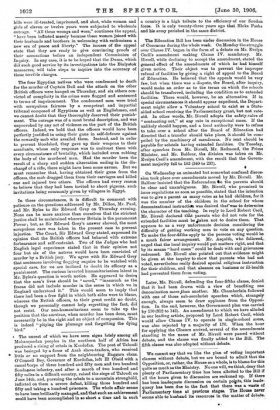In these circumstances, it is difficult to comment with patience
on the questions addressed by Mr. Dillon, Mr. Paul, and Mr. Byles to Sir Edward Grey on Thursday evening. None can be more anxious than ourselves that the strictest justice shall be maintained wherever Britain is the paramount Power ; but, as Sir Edward Grey's answer showed, the most scrupulous care was taken in the present case to prevent injustice. The Court, Sir Edward Grey stated, expressed its opinion that the British officers had behaved with extreme forbearance and self-restraint. Two of the Judges who had English legal experience stated that in their opinion not four but six of the natives would have been convicted of murder by a British jury. We agree with Sir Edward Grey that sentences involving flogging require to be watched with special care, for we are inclined to doubt its efficacy as a punishment. The curious inverted humanitarianism latent in Mr. Byles's question is worth notice. He appeared to desirq that the men's lives should be "saved," "inasmuch as the fracas did not include murder in the sense in which we in England understood it." This would seem to imply that there had been a free fight in which both sides were to blame, whereas the British officers, to their great credit no doubt, though we personally cannot help regretting the fact, did not resist. Our neo-humanitarians seem to take up the position that the survivor, when murder has been done, must necessarily be in the right and an object of compassion. This is indeed " pitying the plumage and forgetting the dying bird." •


























































 Previous page
Previous page